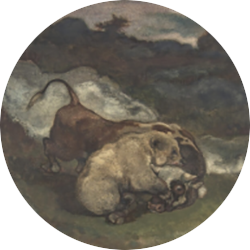Edición 56
Stephen Crane: poemas de Los jinetes negros, por Yanina Audisio
III
En el desierto
vi una criatura, desnuda, bestial
que, agachada sobre la tierra,
sostenía su corazón en sus manos
y comía de él.
Dije: “¿Está bueno, amigo?”
“Es amargo, amargo” –contestó–,
“pero me gusta
porque es amargo
y porque es mi corazón.”
* * *
III
In the desert
I saw a creature, naked, bestial,
who, squatting upon the ground,
held his heart in his hands,
and ate of it.
I said: “Is it good, friend?”
“It is bitter-bitter”, he answered;
“But I like it
because is bitter,
and because it is my heart.”
XXI
Había ante mí
milla tras milla
nieve, hielo, arena quemante.
Y aun podía mirar más allá,
un lugar de belleza infinita;
y podía ver la hermosura de ella
que caminó entre la sombra de los árboles.
Cuando miré
todo estaba perdido
salvo este lugar de belleza y ella.
Cuando miré
y en mi mirada, quise,
entonces volvieron otra vez
milla tras milla
nieve, hielo, arena quemante.
* * *
XXI
There was, before me,
mile upon mile
of snow, ice, burning sand.
And yet I could look beyond all this,
to a place of infinite beauty;
and I could see the loveliness of her
who walked in the shade of the trees.
When I gazed,
all was lost
but this place of beauty and her.
When I gazed,
and in my gazing, desired,
then came again
mile upon mile,
of snow, ice, burning sand.
XXVIII
“La Verdad –dijo un viajero–
es una roca, una fortaleza inmensa;
a menudo he estado allí,
incluso en su torre más alta,
desde donde el mundo se ve negro.”
“La Verdad –dijo un viajero–
es un soplo, un viento,
una sombra, un fantasma;
la he perseguido largo tiempo
pero solo he tocado
el ruedo de su vestido.”
Y yo creí al segundo viajero,
pues la verdad era para mí
un soplo, un viento,
una sombra, un fantasma.
Y nunca he tocado
el ruedo de su vestido.
* * *
XXVIII
“Truth”, said a traveler,
“is a rock, a mighty fortress;
often have I been to it,
even to its highest tower,
from whence the world looks black.”
“Truth”, said a traveler,
“is a breath, a wind,
a shadow, a phantom;
long have I pursued it,
but I have touched
the hem of its garment.”
And I believed the second traveler;
for truth was to me
a breath, a wind,
a shadow, a phantom.
And I never have touched
the hem of its garment.
XXXI
Varios trabajadores
construyeron una gran bola de mampostería
en la cumbre de una montaña.
Luego fueron valle abajo
y se dieron vuelta para contemplar su obra.
“Es imponente” –dijeron–,
y amaron la cosa.
De repente, se movió:
se les vino encima rápidamente
los aplastó hasta quedar solo sangre.
Pero alguno tuvo oportunidad de chillar.
* * *
XXXI
Many workmen
built a huge ball of masonry
upon a mountain-top.
Then they went to the valley below,
and turned to behold their work.
“It is grand”, they said;
they loved the thing.
Of a sudden, it moved:
it came upon them swiftly;
it crushed them all to blood.
But some had opportunity to squeal.
LII
¿Por qué te esfuerzas en pos de la grandeza, tonto?
Arranca una rama y vístela.
Es suficiente.
Señor mío, hay algunos bárbaros
que elevan sus narices
como si las estrellas fueran flores
y tu servidor está perdido entre las hebillas de sus zapatos.
Con gusto igualaría mis ojos con los suyos.
Tonto, arranca una rama y vístela.
* * *
LII
Why do you strive for greatness, fool?
Go pluck a bough and wear it.
It is as sufficing.
My Lord, there are certain barbarians
who tilt their noses
as if the stars were flowers,
and thy servant is lost among their shoe-buckles.
Fain would I have mine eyes even with their eyes.
Fool, go pluck a bough and wear it.
LXVII
Dios yace muerto en el Cielo,
los ángeles cantaron el himno del fin,
vientos púrpuras pasaron gimiendo,
sus alas gota-goteando
sangre
que cayó sobre la tierra.
Ésta, sustancia quejosa,
se puso negra y se hundió.
Entonces desde las lejanas cavernas
de los pecados muertos
vinieron monstruos, lívidos de deseo.
Combatieron,
disputaron el mundo,
una porción.
Pero de todas las tristezas, ésta fue triste:
los brazos de una mujer intentaron proteger
la cabeza de un hombre dormido
ante las garras de la última bestia.
* * *
LXVII
God lay dead in Heaven;
angels sang the hymn of the end;
purple winds went moaning,
their wings drip-dripping
with blood
that fell upon the earth.
It, groaning thing,
turned black and sank.
Then from the far caverns
of dead sins
came monsters, livid with desire.
They fought,
wrangled over the world,
a morsel.
Bot of all sadness this was sad,
a woman´s arms tried to shield
the head of a sleeping man
from the jaws of the final beast.

Noticia Biográfica
Stephen Crane (1871-1900) fue un poeta, novelista y cuentista estadounidense. Su trabajo se enmarca dentro de la tradición realista y se dice que su obra marca el inicio del Naturalismo estadounidense moderno.







